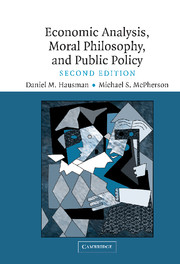13 - Social Choice Theory
Published online by Cambridge University Press: 06 July 2010
Summary
As we saw in Chapter 9, contemporary “Paretian” welfare economics is of relatively little help in evaluating economic institutions and outcomes. Welfare economists often espouse the Pareto principle (that A is better than B if somebody prefers A to B and nobody prefers B to A), but it's a rare day when there is this sort of unanimity. Welfare economists are sometimes tempted to say that A is better than B when A is only a potential Pareto improvement, but as argued in Chapter 9, this view is dubious. Economists need better bases for evaluating economic outcomes and institutions.
The Social Welfare Function and Arrow's Theorem
Social choice theory evolved out of an effort to construct better tools for evaluation. Following Bergson (1938) and Samuelson (1947), let us call any ranking of social states a “social welfare function.” Normative principles can be regarded as constraints on social welfare functions. For example, resource egalitarianism demands that social welfare functions favor egalitarian resource distributions. Nazi principles of “racial purity” narrow the set of acceptable social welfare functions to those that give a low ranking to states of affairs in which Jews prosper. Hedonistic utilitarianism picks out social welfare functions that rank states of affairs in terms of total happiness.
The point of discussing social welfare functions is to provide a framework for exploring normative principles. Although the framework could in principle be applied to a broad range of evaluative criteria – including highly nonindividualistic ones – social choice theorists have in practice focused on social welfare functions whose arguments are individual preferences.
- Type
- Chapter
- Information
- Economic Analysis, Moral Philosophy and Public Policy , pp. 217 - 233Publisher: Cambridge University PressPrint publication year: 2006



